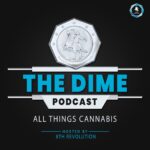[00:07:02] Vince Ning on Nabis’ earliest business plan
It comes back to just what the customer needs. And back then, we didn’t have our B2B marketplace. We didn’t build a Nabis Capital Solution. We didn’t build analytics tools. We just built a website to help people enter orders in that we would deliver and fulfill. We’d collect payments for them and that’s what people needed. They didn’t need some fancy software, they didn’t need AI. They just needed some way to deliver their products from point A to point B compliantly and get paid. We would do the deliveries ourselves just to give that sort of high-touch experience and build a relationship directly with the execs at these companies. They just needed more tools that help them at scale, so that’s how we started to build out and flesh out the rest of our platform, and that’s what currently exists today.
[00:17:45] On the challenges that face some of the California cannabis operators
I’ll say that the biggest challenge right now is just incredibly high taxes. The problem is it’s actually starting at the top of the supply chain with cultivators. Ever since the inception of the California market, there’s been a cultivation tax. An excise tax and cultivation taxes were charged based upon the weight of the flower that was produced.
After last year, there’s been this overproduction, oversupply, of flower that are coming into the world. The average price per pound has fallen significantly, but the weight is still the same, if not more. What ends up happening is the taxes don’t fall in line with the average price per pound.

Vince Ning, CEO of Nabis
Because you’re still paying the same taxes but making less money, we’ve heard cultivators saying that they’re paying up to about 40% of what they have as their revenue in cultivation tax alone, not to mention all the labor costs and the actual cost to produce this product.
[In the legal cannabis industry] what operators will have to do is increase pricing to make their ends meet and who ends up bearing the cost is actually the consumer. And so when the consumer goes and buys weed, they will choose to buy from the illicit market because there are no taxes being applied to their own [production] and costs, and it’s oftentimes the same quality product.

Editors’ Note: This is an excerpt from our Monthly Playbook. If you would like to read the full monthly playbook and join the thousands of others you can sign up below.


